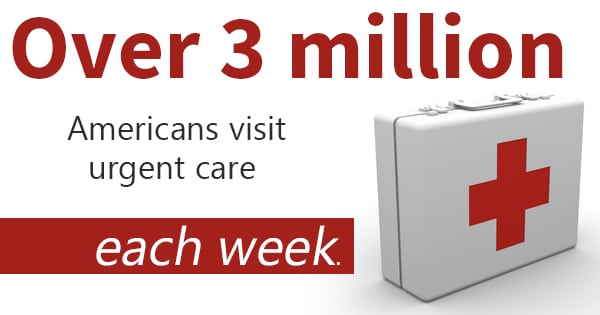
Urgent Care facilities are a great way to get reliable, affordable health care when you need it most. Unfortunately, this fact makes it easy for individuals to visit your nearby Urgent Care when it isn’t needed. In fact, over 3 million Americans visit Urgent Cares each week. So when should you go to Urgent Care? While it’s better to be safe than sorry, here are some of the common symptoms that shouldn’t require Urgent Care assistance.
Scrapes and bruises
Every parent wants to keep their child safe, but bumps and bruises don’t usually require medical treatment. Only bring your child to an urgent care if there was trauma to the head or if there is severe pain.
This goes for adults too. Clean the wound carefully and monitor for signs of improvement. When should you go to Urgent Care? If the pain don’t go away after a few days or it looks like the scrape is infected, seek medical attention at your 24 hour Urgent Care.
Belly aches
Think about your diet and the diet of your child. Did you eat anything out of the ordinary today? Did you eat too much of one good thing? Try at-home remedies to alleviate minor pains before bringing yourself or your child into the emergency room.
Sometimes it can be hard to get your child to tell you what they ate. Instead of asking them to outline their diet, ask them if they tried anything new today. Also, be sure to ask them where the pain is centered. If it’s on the left side of their body beneath their ribs, it might be appendicitis. In that case, you should visit an urgent care or emergency room immediately.
Minor falls
For a healthy adult, falling shouldn’t be an issue unless you experience pain for an extended period of time. However, if you’re elderly or have a young child, you should visit an Urgent Care nearby if you hear anything snap or if you cannot straighten the limb.
Symptoms will typically go away after a minor fall after rest and treatments at home. Try hot and cold remedies along with acetaminophen to alleviate swelling.
Minor colds
We all get sick, especially if you start a new job, there’s a change in season, or if you’re simply a kid. Typically, colds don’t need medical attention unless the individual is experiencing vomiting, dehydration, or has a weakened immune system. If symptoms like diarrhea and mild fevers don’t dissipate quickly, you might have to bring them into an Urgent Care facility.
If you catch yourself looking up, “When should you go to Urgent Care?” consider these options before you enter the waiting room.
